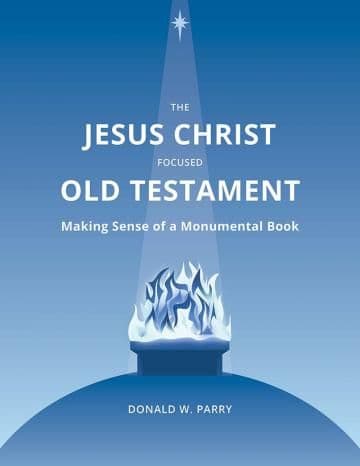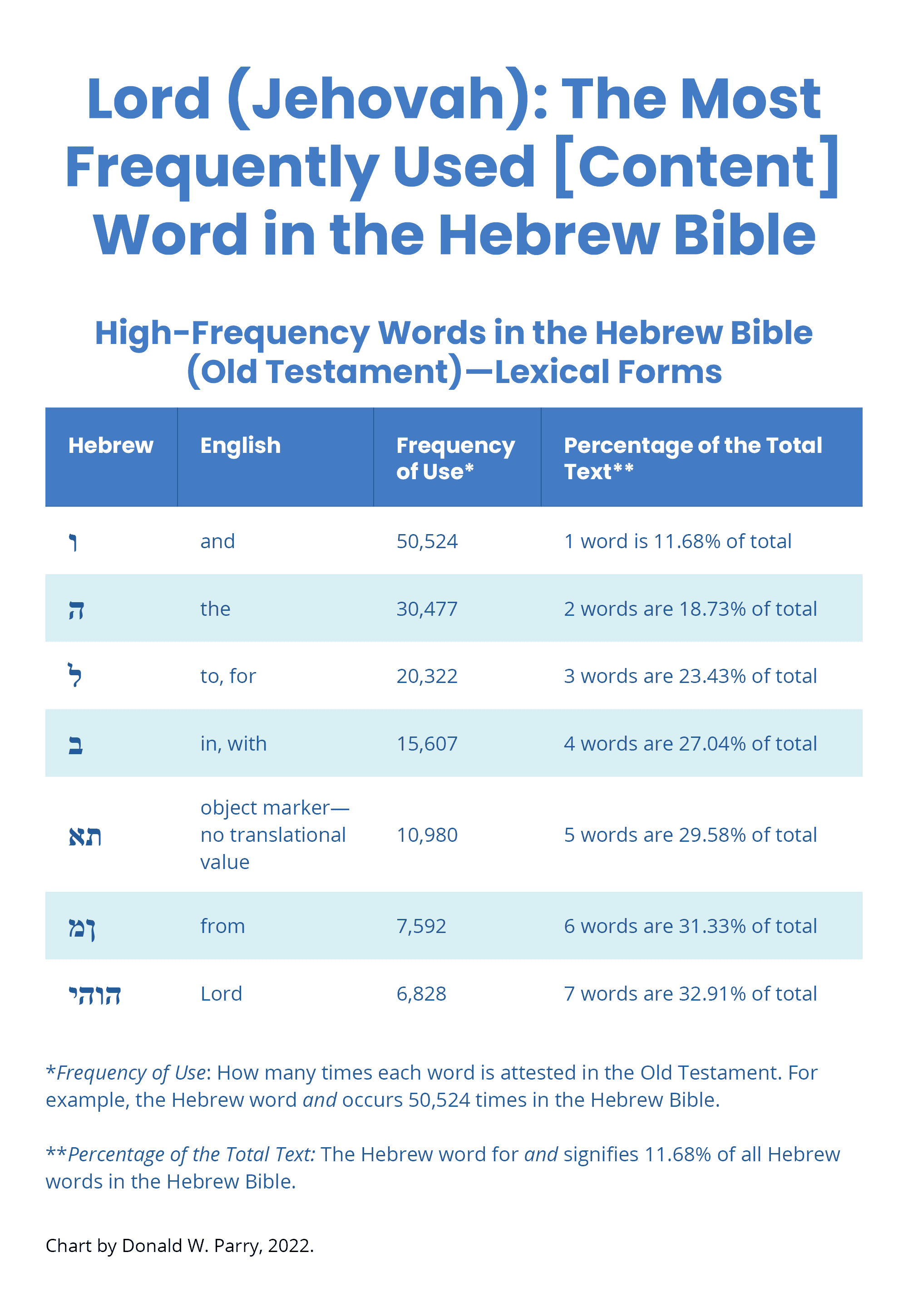Book
56 Chapters

The sacred name Jehovah, derived from the Hebrew YHWH, is found more than 6,800 times in the Old Testament. Jehovah is “the covenant and proper name of the God of Israel,” and Jehovah Himself is none other than “the premortal Jesus Christ.”
Stated plainly, Jesus Christ, under the designation Jehovah, is referred to more than 6,800 times in the Old Testament. This is extremely important because it demonstrates that Jehovah (= Jesus Christ) is more prominent than any other Old Testament topic; Jehovah is the most important word, not only in terms of frequency but also in terms of what this sacred name represents. And each attestation of Jehovah belongs to a context that provides us with understanding regarding His mission, character, or attributes.
Jehovah is frequently referred to nominally, but more often the name is pronominalized, meaning Jehovah is very frequently the referent of inflectional elements (e.g., affix of a verb, preposition, noun); referential elements include possessive determiners (e.g., your, his, my), independent pronouns (e.g., he, you, I), or direct or indirect objects (e.g., me, him). Thus, linguistically, Jehovah is the most frequently used content word in the Old Testament, and through pronominal forms, Jehovah possesses the most prominent character zone. In the Old Testament, Jehovah’s topical apportionment is abundantly greater than any other topic. What does this mean to us? It means that Jesus Christ is the most prominent character in the Old Testament, but under the title Lord.
Specifically, Lord is found in the Pentateuch (Genesis, Exodus, Leviticus, Numbers, Deuteronomy) in about 1,800 instances. Isaiah and Psalms use the Tetragrammaton (the Hebrew name of the Lord, which is transliterated in four letter as YHWH) more than 1,100 times. Lord is also found throughout most of the other Biblical books.
Excursus: Function versus Content Words: All literary writings, including the Old Testament, consist of function and content words. Function words (or discourse particles) serve in utilitarian capacities in the sentence structure. They are generally small words (single-character words, two-character words, three-character words, etc.), such as conjunctions, definite articles, interrogatives, negative particles, prepositions, and pronouns. Examples of English function words include a, all, an, and, as, at, be, but, by, for, from, he, her, I, in, it, no, not, of, on, or, she, so, than, that, the, their, this, to, up, we, what, which, and who.
Content words have a major role, regardless of the text-type or genre, because they provide substance to a composition. Content words are adjectives, adverbs, common nouns, proper nouns, and verbs. English examples include Assyria, cart, dancing, earth, field, grass, heaven, horse, house, Israel, king, queen, riding, rope, Sarah, tree, walking, and wheat.
Both function and content words are vital to a literary work, but content words provide its meaning and significance. Function and content words interact to make up an infinite number of expressions, which formulate sentences, paragraphs, and compositions.
The first six words in the Hebrew Bible, in terms of frequency, are function words (see table below). These six words, in order of frequency, are translated as follows: and, the, to/for, in/with, object marker (non-translatable), and from. The first content word is Lord, which is attested in the Hebrew Bible more than 6,800 times.
Hebrew | English Translation | Frequency of Use* | Percentage of the Total Text** |
|---|---|---|---|
ו | and | 50,524 | 1 word is 11.68% of total |
ה | the | 30,477 | 2 words are 18.73% of total |
ל | to, for | 20,322 | 3 words are 23.43% of total |
ב | in, with | 15,607 | 4 words are 27.04% of total |
את | object marker—no translational value | 10,980 | 5 words are 29.58% of total |
מן | from | 7,592 | 6 words are 31.33% of total |
יהוה | Lord | 6,828 | 7 words are 32.91% of total |
*Frequency of Use: How many times each word is attested in the Old Testament. For example, the Hebrew word and occurs 50,524 times in the Hebrew Bible.
**Percentage of the Total Text: The Hebrew word for and signifies 11.68% of all Hebrew words in the Hebrew Bible.
Book | #hits* | fpt* |
|---|---|---|
Genesis | 165 | 5.13 |
Exodus | 398 | 15.36 |
Leviticus | 311 | 16.65 |
Numbers | 396 | 15.81 |
Deuteronomy | 550 | 23.89 |
Joshua | 224 | 14.15 |
Judges | 175 | 11.33 |
Ruth | 18 | 8.88 |
1 Samuel | 320 | 15.38 |
2 Samuel | 153 | 8.92 |
1 Kings | 257 | 12.68 |
2 Kings | 277 | 14.80 |
1 Chronicles | 175 | 10.44 |
2 Chronicles | 384 | 18.07 |
Ezra | 37 | 6.23 |
Nehemiah | 17 | 1.99 |
Esther | 0 | 0.00 |
Job | 32 | 2.56 |
Psalms | 695 | 23.25 |
Proverbs | 87 | 8.92 |
Ecclesiastes | 0 | 0.00 |
Song of Solomon | 0 | 0.00 |
Isaiah | 450 | 17.67 |
Jeremiah | 726 | 22.10 |
Lamentations | 32 | 13.70 |
Ezekiel | 434 | 14.65 |
Daniel | 8 | 0.84 |
Hosea | 46 | 12.77 |
Joel | 33 | 22.84 |
Amos | 81 | 26.70 |
Obadiah | 7 | 16.06 |
Jonah | 26 | 23.96 |
Micah | 40 | 18.83 |
Nahum | 13 | 15.64 |
Habakkuk | 13 | 12.87 |
Zephaniah | 34 | 30.14 |
Haggai | 35 | 38.08 |
Zechariah | 133 | 27.56 |
Malachi | 46 | 35.06 |
Column 1 gives the name of the Old Testament book. Column 2 provides the number of actual occurrences of the word Lord in each of the books. For example, Lord occurs 165 times in Genesis, 398 times in Exodus, 450 times in Isaiah, and so forth. Column 3 sets forth the hits per thousand words in each book. In this study, all texts have been normalized using a frequency-per-thousand (fpt) technique. Normalization converts the actual token count to a norm for purposes of comparison. The computerized tool that provides the fpt count is Accordance.
Book
56 Chapters


Items in the BMC Archive are made publicly available for non-commercial, private use. Inclusion within the BMC Archive does not imply endorsement. Items do not represent the official views of The Church of Jesus Christ of Latter-day Saints or of Book of Mormon Central.